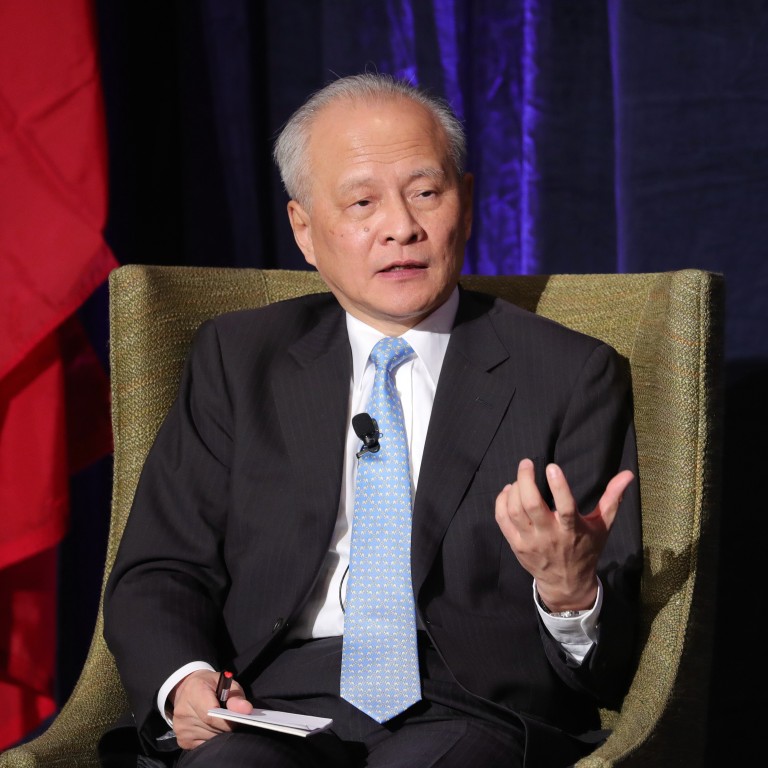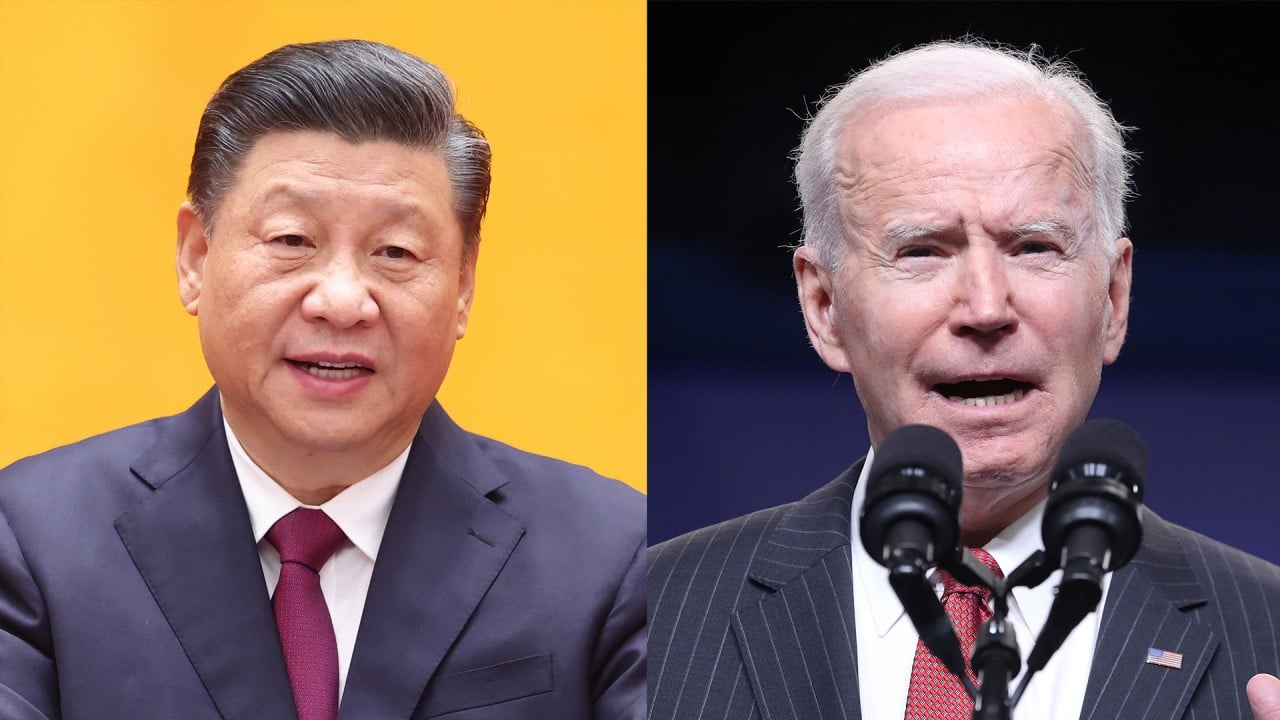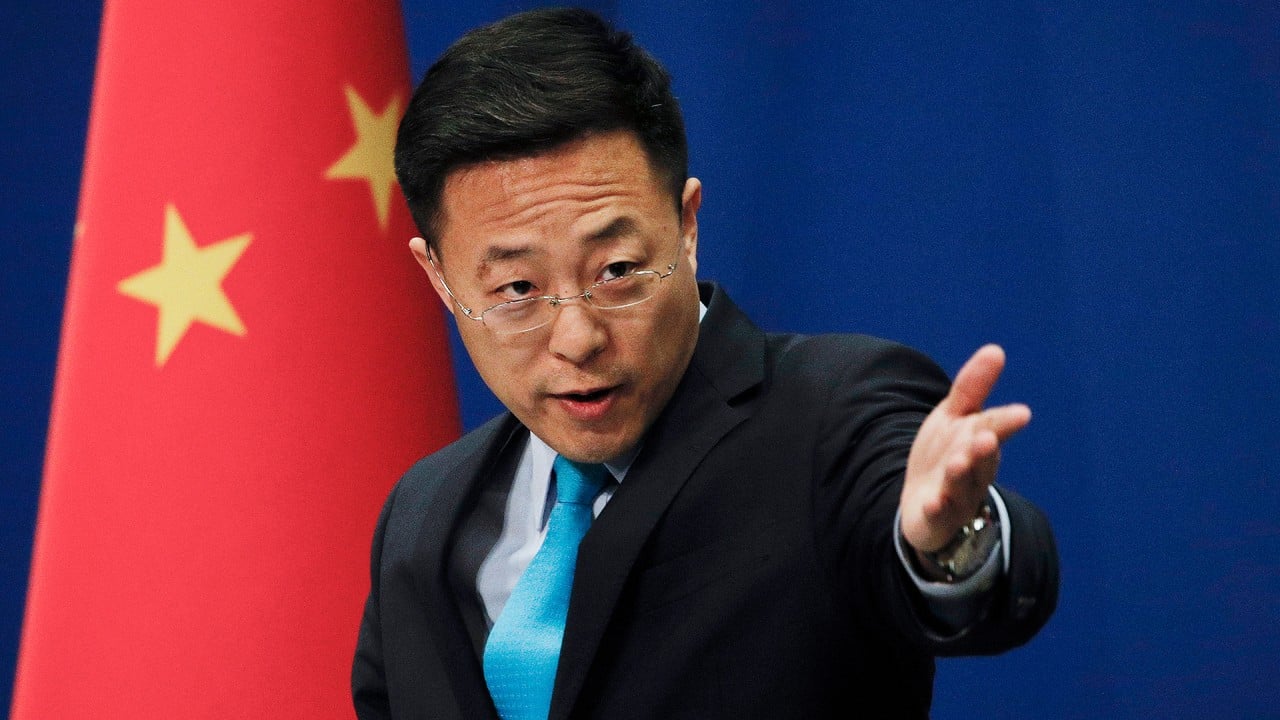
Will China choose a Wolf Warrior or smooth diplomat to replace Cui Tiankai as its US envoy?
- Analysts say next appointment will indicate whether Beijing wants to reset US-China relations after tough diplomatic times
- Long-serving ambassador to Washington was asked to stay on for the Trump years but is well past retirement age
“Definitely Beijing needs someone who can help and promote this relationship,” said Zhiqun Zhu, chair of the international relations department at Bucknell University. “It’s been a tough few years and it looks like the two sides are willing to restart. It may be a good opportunity.”
China’s man in the US: a veteran with the trust and ties for turbulent times
Other ideal attributes for a Chinese ambassador at this juncture would be a diplomatic personality and someone with a sense of humour, as well as a keen understanding of American politics, analysts said. Some version of self-deprecation was likely to play much better than a hardline approach at a time of growing US wariness towards China, they added.
“No matter how often people say the US doesn’t understand China and China understands the US, I think China often misunderstands the US,” said Elizabeth Economy, a senior fellow at Stanford University’s Hoover Institution.
“That said, no amount of diplomatic activities will work if China’s policies continue the way they are,” she added, citing chest-thumping in the South China Sea, around Taiwan and along China’s de facto border with India.
Foreign vice-minister Ma Zhaoxu had been well groomed for the role, according to Yun Sun, China programme director at the Stimson Centre. Ma has the appropriate rank and experience for one of Beijing’s most important diplomatic positions, which oversees a complex relationship, she said.
Ma is also 11 years younger than Cui, representing a younger generation. “People will expect different styles although the theme of the bilateral relations is unlikely to change,” Sun added.

James Green, Georgetown University senior fellow and former trade negotiator based in the US embassy in Beijing, recalled working with Ma, who was then head of the foreign ministry’s policy planning department, in 2007 and 2008.
“He‘s a very smart guy, but I was struck by his lack of knowledge in economics,” Green said, adding that Ma was quite doctrinaire. “He’s a communist’s communist. I don’t think it would serve him well in Washington right now.”
Last week, Ma had an “in-depth exchange” with US special envoy for Iran Robert Malley. Green suspects the US embassy approached the Chinese foreign ministry to talk about Iran and the call was handed to Ma, given his role handling multilateral affairs.
We’re not Wolf Warriors, we’re only defending China, says minister
According to Andrew Mertha, director of China studies at the John Hopkins School of Advanced International Studies in Washington, Ma had credibility for the role. “He will communicate in a way that is straight, no chaser, but without having to engage in the Wolf Warrior genuflecting to demonstrate that he is loyal to Beijing,” he said.
“Ambassador Cui is a gifted diplomat, and he was in an unenviable position over the past few years. He will be a tough act to follow, but Ma would be the right person at the right time, one that will hopefully – and refreshingly – be governed by straight talk between the two sides.”
Mertha added that Biden had set the stage for such frank discussion in his interview with CBS last weekend, particularly with his comment that Xi “doesn’t have a democratic, small-D, bone in his body”. It was a signal to the US leader‘s domestic audience “exactly what kind of regime the Biden administration is engaging and that it is doing so with eyes wide open”, he said.
“This acceptance at the very outset to agree to disagree about our respective political visions means we don’t have to endlessly relitigate this reality, so that we can get right to the issues at hand,” he said.

00:54
US-China confrontation would be ‘disaster’, Xi says in first phone call with Biden
All observers agreed that any replacement will have big shoes to fill. Cui was supposed to end his tenure at the beginning of the Trump administration around 2017, but was asked to stay on.
“Poor guy, I think he just wants to go home,” Economy said. “Frankly, Cui must be exhausted. And the position demands someone who’s going to bring a lot of energy to the position – new ideas, a fresh outlook and not burdened by eight years of very tumultuous relationship, in part because of Trump but also China itself.”
Analysts said it was not a job most would relish, despite its heady prestige and importance. “It’s a crappy job, not to put lipstick on it,” Green said. “That hasn’t just been the Trump administration. They’re serving a master in Beijing that’s fickle. You’re under the white hot glow all that time.”
In a sign of some of the internal tensions and pressures inherent in the job, Cui pushed back publicly last March, when he dismissed as “crazy” comments by Beijing-based foreign ministry spokesman – and hardline Wolf Warrior – Zhao Lijian, that the Covid-19 virus might have been introduced to China by US Army athletes attending military games in Wuhan.

01:55
Chinese foreign ministry spokesman claims US army brought coronavirus to Wuhan
Xi is unlikely to replace Cui with one of Zhao’s fellow warriors – named after a patriotic series of Chinese films – the analysts said. Most are from a younger generation and are not high enough in the pecking order to be Beijing’s ambassador to the US, they said.
Another mark against them is how it might be interpreted. “If they were to send a Wolf Warrior diplomat to Washington, it would basically signal that Beijing had no interest in trying to find common ground,” Economy said.
Analysts said the lack of unanimity within China’s diplomatic ranks may reflect in part a desire to play “good cop, bad cop” with foreign adversaries. But it also reflected a change in the traditional role of the foreign ministry, a relatively weak agency in the Chinese government system, some said.
China urged to call off the Wolf Warriors to build ties with Biden
Several years ago, ministry briefings were largely aimed at a global audience. Today, they are increasingly aimed at the Chinese people, and can be useful to placate nationalists worried that China is not standing up enough to foreign powers.
“They’re not going to give up this tool because it’s helpful domestically,” Green said. “Clearly the Wolf Warriors are not doing this on their own, they have the blessing of Xi.”
Another factor in the equation, according to analysts, was the growing importance attached to remarks made by China’s envoys – who often said the same things a decade or two ago when they were less consequential on the global stage, so that few paid close attention.
China’s Wolf Warriors are like Simba from Lion King, its foreign ministry says
Analysts said they gave Cui solid marks for handling an extremely difficult job during four hugely stressful years.
“He did a good job in trying times, has good interpersonal skills, good English, doesn’t come across as arrogant or pushy,” Green said. “I hope Cui finds something more relaxing, something where he’s listened to and his expertise can be used.”
Possible next chapters for Cui could include a spot on the National People’s Congress, or a position at a foreign ministry-affiliated think tank where he could continue to exert foreign policy influence. Another potential move could be to a prestigious quasi-international position, such as head of the Boao Forum, China’s answer to the World Economic Forum.


